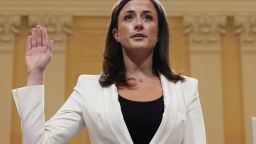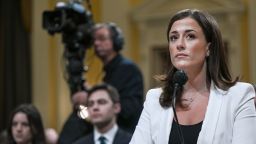Editor’s Note: Julian Zelizer, a CNN political analyst, is a professor of history and public affairs at Princeton University. He is the author and editor of 24 books, including, “The Presidency of Donald J. Trump: A First Historical Assessment.” Follow him on Twitter @julianzelizer. The views expressed in this commentary are his own. View more opinion on CNN.
The revelations uncovered by the January 6 committee continue to shock and awe. Tuesday’s bombshell hearing, featuring former White House aide Cassidy Hutchinson, provided a stunning look into what occurred in the hours surrounding the insurrection: a president who was allegedly physically and emotionally out of control and a White House team that understood the potential for violence on January 6 but failed to prevent the riot.
Previous hearings had already established the many attempts by former President Donald Trump and his allies to overturn the 2020 election, despite being told repeatedly that there was no widespread fraud. According to the testimony of Acting Deputy Attorney General Richard Donoghue last week, the former President told Acting Attorney General Jeffrey Rosen, “Just say the election was corrupt and leave the rest to me and the Republican congressmen.”
This week, Hutchinson’s claims, made under oath, managed to provide even more disturbing details about an already troubling chapter in US history – much of which we witnessed with our own eyes.
US Attorney General Merrick Garland is now facing pressure to take action. Although the Department of Justice (DOJ) is likely reluctant to pursue charges and set a precedent of prosecuting a former president, it is certainly wrestling with the question of how to approach the evidence laid out by the House select committee.
Regardless of whether the DOJ decides to press charges, Congress should act swiftly to shore up our democracy through legislation. Without accountability, democracies can quickly wither, and Hutchinson’s testimony was yet another wake-up call to leaders who have been asleep at the wheel.
For clues on how to proceed, look back to then-President Gerald Ford’s infamous decision to pardon former President Richard Nixon on September 8, 1974, for any crimes that he might have committed.
The pardon remains one of the most controversial moments of the 1970s, when the commander in chief chose political healing over accountability, leaving the problem of presidential abuse of power unresolved.
Despite Ford’s decision, however, Congress spent much of the decade after the Watergate scandal looking at the institutions that had allowed Nixon to do what he did and introducing legislation during a rare period of institutional introspection and robust government reform.
Fixing the political process became a staple feature of politics, with organizations such as Common Cause (founded in 1970) insisting that repairing the way politics worked was as essential as taking on “bad apples.”
According to John Gardner, the group’s founder, the “renewal of institutions and processes” was the key to restoring citizen confidence. An entire public interest movement emerged to pressure legislators and presidents to tackle these issues.
In 1973, with the public aware of the ways that Presidents Lyndon B. Johnson and Nixon had used executive power to keep sending troops into the disastrous war in Vietnam, Congress passed the War Powers Act to restore more inter-branch balance over the decision to engage in military action overseas.
In 1974, the Congressional Budget and Impoundment Control Act was passed to centralize and strengthen the legislative budget process after Nixon had used methods like the impoundment of funds to circumvent the decisions of Capitol Hill.
That same year, Congress amended a campaign financing law from 1971 by passing the Federal Election Campaign Financing Reform Act of 1974, which created a system of publicly financed presidential elections, put into place contribution and spending limits and established the Federal Election Commission although later Supreme Court decisions have lifted many limits on political contributions.
In 1978, Congress passed the special prosecutor provision as part of a broader ethics package that then-President Jimmy Carter supported – which, until 1999, allowed prosecutors to investigate charges of executive-level misconduct without having to fear the president’s retaliation.
Congress reformed its own chambers with ethics rules that imposed restrictions on conflict-of-interest, along with sunshine rules that opened the chambers to public scrutiny. And there was more.
To be sure, many of these reforms accomplished their goals. Some had unintentional effects that created new problems in our body politic – such as independent prosecutors who were seen as lacking accountability. Others, like the War Powers Act or sunshine laws, were not strong enough to curb the weaknesses that had been exposed by Nixon.
But at least Congress tried. The House and Senate elevated government reform as a top priority and moved forward with legislation that addressed structural problems in our system. There were reforms like the publicly financed system for presidential elections, which for many decades had positive effects.
When the House select committee on January 6 is done with its work, Congress must focus on reform. A few weeks ago, a bipartisan coalition reached an agreement on reforming the Electoral Count Act of 1887 and is working on text for legislation.
The reforms would clarify and restrict the role that the vice president plays in the process of counting the Electoral College votes and make it more difficult for there to be a challenge of a state’s slate of electors. Of all the reforms, this one stands the best chance of passing, and the January 6 committee’s work might provide the public support for doing so.
Reforming the Electoral Count Act must be only a first step, however. The crisis of the 2020 presidential election also reveals the broader risks to voting rights, since many state legislatures have used the lie that there was widespread fraud to introduce more voting restrictions.
Even though claims of massive voting fraud have been debunked on numerous occasions – with high-level Trump officials, such as former US Attorney General William Barr, making the point on video – this has remained a centerpiece of efforts in red states to undermine the legacy of the Voting Rights Act of 1965.
The push to enact the For the People Act and John Lewis Voting Rights Advancement Act failed due to a combination of Republican resistance and the refusal of Democratic Sens. Joe Manchin and Kyrsten Sinema’s refusal to carve the legislation out of the filibuster rules. Legislation to strengthen voting rights protection is essential as many red states ramp up their efforts to make it more difficult to vote.
Finally, other reforms merit discussion. During the earlier phases of the January 6 committee meetings, there was some talk about reforming the Insurrection Act of 1807 to raise the bar for presidents to deploy troops at home and clarify the circumstances in which it could be invoked.
As Americans gather to celebrate July 4, they should take a break from the beer and hot dogs to think about the state of our democracy. Being patriotic requires every citizen to devote attention and energy to making certain that our cherished institutions are working.
Get our free weekly newsletter
The January 6 hearings are revealing once again that they are not. It was too easy for the former administration to do what it did, and it’s clear how the events of January 6 could have ended in a different way.
If it wasn’t already apparent, the risks to our democracy have been laid bare by the January 6 committee. To quote Robert Redford’s character in the film “The Candidate,” Congress must now ask itself, “What do we do now?”







